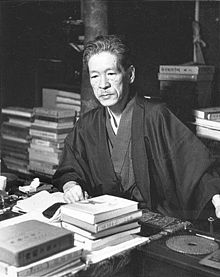Shūsei Tokuda
This article needs additional citations for verification. (September 2021) |
Shūsei Tokuda | |
|---|---|
 Shūsei Tokuda | |
| Born | 1 February 1872 Kanazawa, Ishikawa, Japan |
| Died | 18 November 1943 (aged 71) Tokyo, Japan |
| Occupation | Writer |
| Literary movement | Naturalism |
Shūsei Tokuda (徳田秋声, Tokuda Shūsei, 1 February 1872 – 18 November 1943, real name Sueo Tokuda) was a Japanese writer.
Life
Tokuda was born in Kanazawa in Ishikawa Prefecture.[1] Coming from a family of the former feudal nobility, Tokuda began his literary life as a follower of the writer Ozaki Kōyō, who was four years his senior and had already established himself as a literary man in the late 1880s. Their relationship wasn't to last long, though, with Kōyō dying in 1903, after which Tokuda began to move from Kōyō's style of romanticism into a mixture of naturalism and the confessional known as "Shizen-shugi", an example of which is his 1908 novel Arajotai (新世帯), which dealt with the frustrations of a young working-class couple.
After the publication of Ashiato (足迹) in 1910, Tokuda would release his most autobiographical work, Kabi (黴), in 1911, a classic example of the Japanese genre known as the "I-novel". He followed with the novel Rough Living (Arakure, あらくれ) in 1915.
After the death of his wife in 1926, Tokuda began a series of relationships with younger women, which would inspire his later works, especially his best-known, Kasō jinbutsu (仮装人物), released from 1935 to 1938, as well as the unfinished Shukuzu (縮図) from 1941.
Legacy
A number of Tokuda's works were adapted into films in Japan.[2] A monument honoring Tokuda was erected near the summit of Mount Utatsu in 1947. The monument features writing authored by poet Murō Saisei and was designed by architect Yoshirō Taniguchi.
Selected works
- 1910: Ashiato
- 1911: Kabi
- 1915: Rough Living (Arakure)
- 1933: The Town's Dance Hall (Machi no odoriba)
- 1935: Order of the White Paulownia (Kunshō)
- 1935–1938: Kasō jinbutsu
- 1941: Shukuzu (unfinished)
Bibliography
- Tokuda, Shusei (2001). Rough Living. Translated by Torrance, Richard. University of Hawaii Press. ISBN 0824823877.
- Rimer, J. Thomas, ed. (2005). "The Town's Dance Hall". The Columbia Anthology of Modern Japanese Literature: Volume 1: From Restoration to Occupation, 1868-1945. Columbia University Press.
- Morris, Ivan, ed. (1962). "Order of the White Paulownia". Modern Japanese Stories: An Anthology. ISBN 0804833362.
- Torrance, Richard (1994). The Fiction of Tokuda Shusei, and the Emergence of Japan's New Middle Class. Washington University Press.
Adaptations (selected)
- 1953: Epitome (Shukuzu), director Kaneto Shindō
- 1957: Untamed (Arakure), director Mikio Naruse
- 1962: Stolen Pleasure (Tadare), director Yasuzō Masumura
References
- ^ "徳田秋声 (Tokuda Shūsei)". Kotobank (in Japanese). Retrieved 13 September 2021.
- ^ "徳田秋声 (Tokuda Shūsei)". Kinenote (in Japanese). Retrieved 14 September 2021.
External links
- Works by or about Shūsei Tokuda at the Internet Archive
- Works by Shūsei Tokuda at LibriVox (public domain audiobooks)

- Shūsei Tokuda at Find a Grave
- Shūsei Tokuda at IMDb
